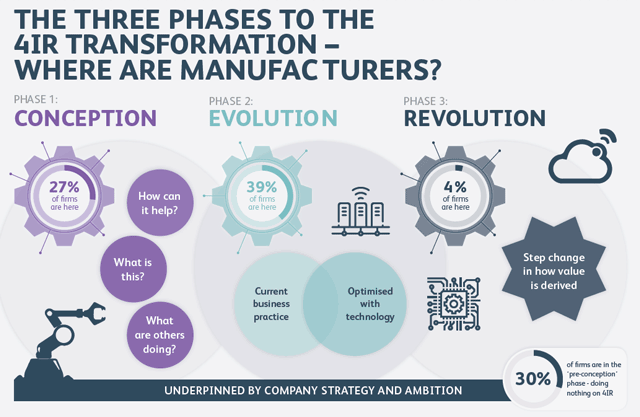 Manufacturers are increasing investment in fourth industrial revolution technologies, with new evidence that many companies have moved beyond the initial “conception” phase and into the “evolution” phase where they are seeing real benefits from their investments. This is according to a new survey of manufacturers by the EEF, reported in a new fact card, How 4IR is transforming manufacturing productivity.
Manufacturers are increasing investment in fourth industrial revolution technologies, with new evidence that many companies have moved beyond the initial “conception” phase and into the “evolution” phase where they are seeing real benefits from their investments. This is according to a new survey of manufacturers by the EEF, reported in a new fact card, How 4IR is transforming manufacturing productivity.
However, the survey also shows that majority (57%) of manufacturers have yet to make any investment. It identifies barriers standing in the way of additional investment, and the EEF calls on both industry and the Government to do more work together to overcome these as part of the industrial strategy.
According to EEF, new digital technologies are rapidly transforming European manufacturing, with investment in 4IR technologies being vital to achieving a step change in UK manufacturing productivity given performance has flat-lined in the decade since the financial crisis. But the survey found that only one in four companies see the UK as being in a leadership position in the fourth industrial revolution (4IR).
The EEF identifies three phases or 4IR transformation: conception or examining how 4IR might help and what others are doing, evolution, where current business practice is optimised through investment in new technologies, and revolution, where a step change in how value is derived takes place. Technologies being employed include the internet of things and analytics, augmented reality, and cobots.
Almost two-thirds of companies (64%) say they are familiar with the concept of 4IR, up from 42% in 2016. Over two-fifths (43%) of companies have moved beyond the initial conception phase to the evolution phase and are making investments. Only 4% consider themselves to be in the revolution phase. But 30% are still at a “pre-conception” stage where they are currently taking no action on 4IR.
Companies that are investing anticipate or have achieved benefits including improved labour efficiency (35%), improved machine utilisation rates (34%) ,and increased production flexibility (32%).
But significant barriers remain. Lack of skills for implementation tops the list for 88% of companies overall. For those in the pre-conception phase the biggest barrier is not understanding how technologies can help the business. For those investing the most in 4IR, the biggest barrier is data compatibility between systems (42%).
There has been some progress in recent months in areas such as delivering the full fibre digital infrastructure that 4IR will depend on, the organisation says, but progress is still urgently needed.
The EEF calls on the Government to announce plans for the Made Smarter Commission, delayed since February, and to back the Industrial Strategy Challenge Fund wave 3 bid for industrial digitisation. This will help address the lack of understanding about the benefits of new digital technologies.
Manufacturers who are investing can also help by sharing more widely their 4IR experience through EEF, by emailing 4ircasestudies@eef.org.uk.
The survey covered 241 companies and was conducted in May.
For more on the fourth industrial revolution and the digital transformation of manufacturing, visit www.eef.org.uk/fourthindustrial

